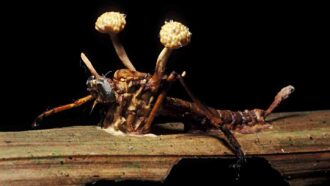
antenna: (plural: antennae or antennas) In biology: Both of a pair of lengthy, skinny sensory appendages on the heads of bugs, crustaceans and another arthropods.
birds: Heat-blooded animals with wings that first confirmed up throughout the time of the dinosaurs. Birds are jacketed in feathers and produce younger from the eggs they deposit in some type of nest. Most birds fly, however all through historical past there have been the occasional species that don’t.
egg: A reproductive cell that comprises half of the genetic info essential to type a whole organism. In people and in lots of different animals, ovaries produce eggs. When an egg fuses with a sperm, they mix to supply a brand new cell, referred to as a zygote. This is step one within the improvement of a brand new organism.”
fungi: (sing: fungus) Organisms with a number of cells that reproduce by way of spores and feed on dwelling or decaying natural matter. Examples embody mould, yeasts and mushrooms.
fungus: (plural: fungi) One in every of a gaggle of single- or multiple-celled organisms that reproduce by way of spores and feed on dwelling or decaying natural matter. Examples embody mould, yeasts and mushrooms.
genus: (plural: genera) A gaggle of intently associated species. For instance, the genus Canis — which is Latin for “canine” — contains all home breeds of canine and their closest wild kinfolk, together with wolves, coyotes, jackals and dingoes.
intestine: An off-the-cuff time period for the gastrointestinal tract, particularly the intestines.
host: (in biology and drugs) The organism (or setting) through which another factor resides. People could also be a short lived host for food-poisoning germs or different infective brokers. (v.) The act of offering a house or setting for one thing.
humidity: A measure of the quantity of water vapor within the ambiance. (Air with a whole lot of water vapor in it is called humid.)
insect: A kind of arthropod that as an grownup may have six segmented legs and three physique components: a head, thorax and stomach. There are tons of of hundreds of bugs, which embody bees, beetles, flies and moths.
parasite: An organism that will get advantages from one other species, referred to as a bunch, however doesn’t present that host any advantages. Basic examples of parasites embody ticks, fleas and tapeworms.
species: A gaggle of comparable organisms able to producing offspring that may survive and reproduce.
spore: A tiny, sometimes single-celled physique that’s fashioned by sure micro organism in response to dangerous situations. Or it may be the single-celled reproductive stage of a fungus (functioning very like a seed) that’s launched and unfold by wind or water. Most are protected in opposition to drying out or warmth and may stay viable for lengthy intervals, till situations are proper for his or her progress.
steer: To information the motion of one thing (a automobile, an individual or an concept) in some explicit path.
venom: A toxic secretion of an animal, corresponding to a snake, spider or scorpion, often transmitted by a chew or sting.
virus: Tiny infectious particles consisting of genetic materials (RNA or DNA) surrounded by protein. Viruses can reproduce solely by injecting their genetic materials into the cells of dwelling creatures. Though scientists ceaselessly confer with viruses as stay or lifeless, actually many scientists argue that no virus is actually alive. It doesn’t eat like animals do, or make its personal meals the best way vegetation do. It should hijack the mobile equipment of a dwelling cell with the intention to survive.
